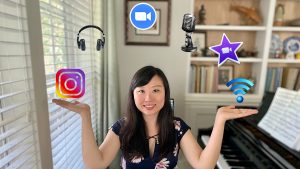“I have had neighbors, strangers and a lot of different people writing to me to say thank you for the music I have worked on because it made their day better.”

Clara Yang
Associate professor and head of keyboard studies in the College of Arts & Sciences’ music department
10 years at Carolina
Tell us a little about your work with the music department. Have you been working at home?
There are two different sides to my activities. One is my research as a performer, which is performing concerts of different kinds, like solo recitals, chamber music and collaborations with other composers and artists. I also teach advanced piano lessons and piano ensemble courses. I’ve been working from home since March, and I haven’t taught anyone at the school since we were told to go home.
How has your work changed since the start of the pandemic?
Before the pandemic, I traveled a lot within the United States, as well as internationally. As a performer, the change is drastic because the world for performing arts is entirely different right now. But I think this is a time we have to be creative and think of other ways to connect with people.
Since March, I’ve collaborated with a lot of people in places like California, London and Madrid. We’ve done video projects, virtual collaborations and virtual compositions, where my colleagues and I would compose a piece together and then perform it virtually to record it and then put our parts together. I think using online platforms like social media really helps us reach more diverse audiences. When you play an in-person concert, you expect certain people to come, but one of my goals is to broaden that attendance population and reach out to more people with diverse backgrounds so they get a sense of what we do.
What has been the biggest challenge in transitioning to work at home?
Transitioning to teaching instrumental lessons online has been challenging because there’s such a difference in sound quality.
When we had to make the switch to online learning, I think my students handled the transition really well. Zoom is fine for talking, but when it comes to music-making on a high level, it’s very difficult because our current technology is not good enough to sound realistic. I would ask my students to send me videos in advance taken from their phones so we could talk about their playing in our lessons and listen or watch the videos together. And, actually, this was a great way for them to learn because they were observing their own playing with me. They were thinking more critically by watching their own actions while playing and listening.
I’ve also had to learn how to communicate better, because there are many things music teachers do in person very instinctively. When a student plays, you can clap with them or play with them to get them into the energy and the feeling of the piece. But you can’t do any of that because of the latency issues on the internet, so I’ve had to learn with my students how to communicate without interruptions. It sounds kind of simple, but recognizing the importance of “you speak, then I speak.” I try to keep my remarks precise, and I try not to give too much information, so my students don’t feel overwhelmed.
How do you maintain a sense of community with your colleagues?
I still do music collaborations with my colleagues at Carolina. We just had a jazz concert that I helped organize at Moeser Auditorium. It’s nice to see music still going on even during this time, and I think through collaborations inside the music department, we are maintaining our connection with each other. We of course sometimes see each other over Zoom, too.
I think the virtual musical collaborations that I have done have also been helpful for other people during this time. I have had neighbors, strangers and a lot of different people writing to me to say thank you for the music I have worked on because it made their day better. It’s a simple, little thing but it makes me feel very happy because I think that’s the point of becoming a musician. I’ve posted a bunch of videos on Instagram, too, and I think people have also really enjoyed that.
How are you continuing to support Carolina’s mission?
Arts and music are very important on this campus. One of my goals is to make music more accessible to the general population and help people understand that classical music is not just for certain groups of people with a specific education level.
I want to use different types of concert and collaboration to help break the barrier of classical music and create a community that is inclusive, which I think is also a big goal at Carolina.
I’d like to continue to be a contributor in my field of music to make people understand that arts and music are absolutely essential things in our lives. I hope to inspire my students to have creative ideas, connect with the community and work on projects that are meaningful. I think classical music is evolving at the same time as society, and I want to help people understand that it is not a boxed-up genre.
